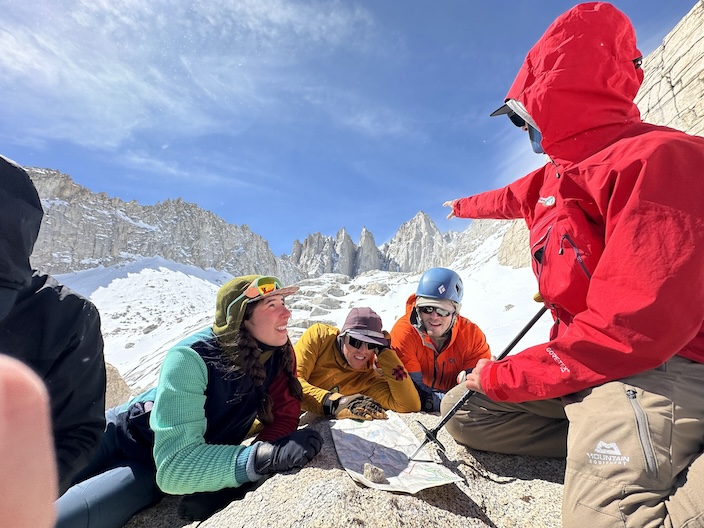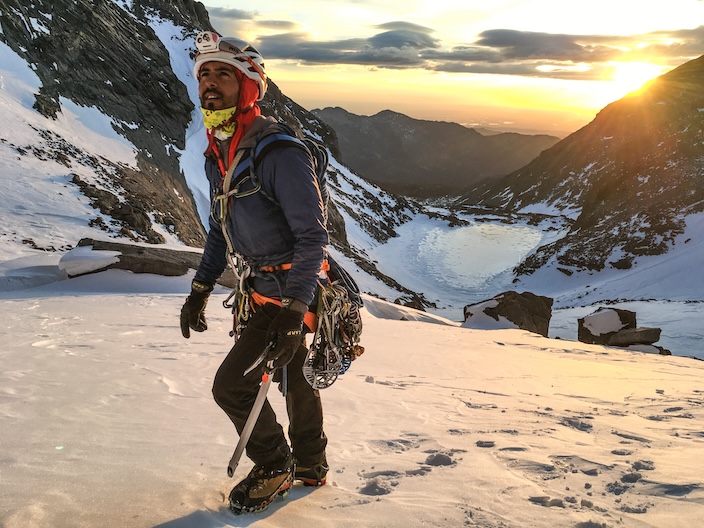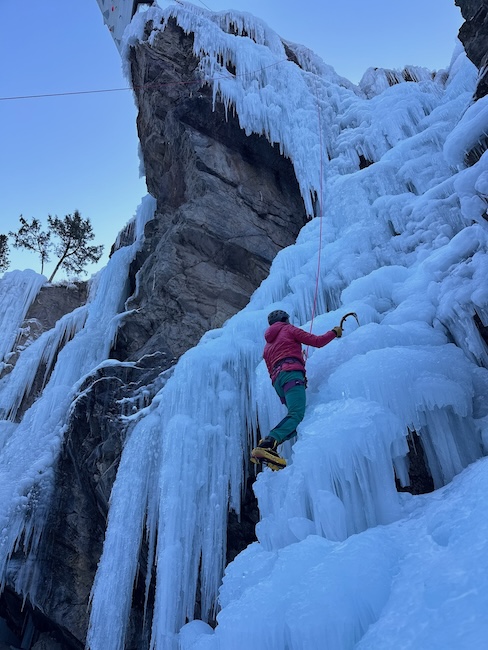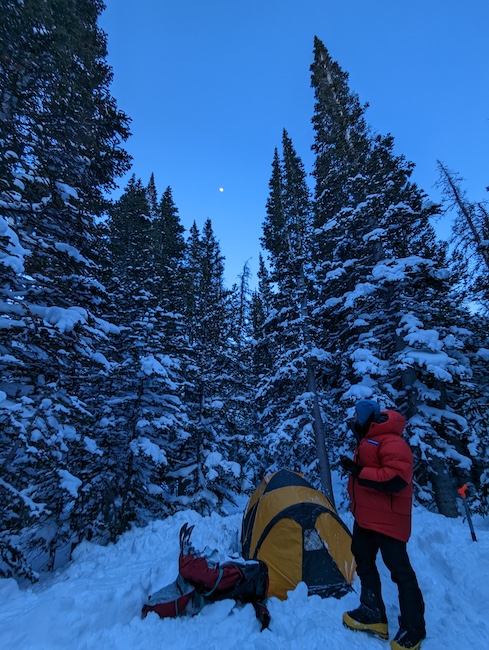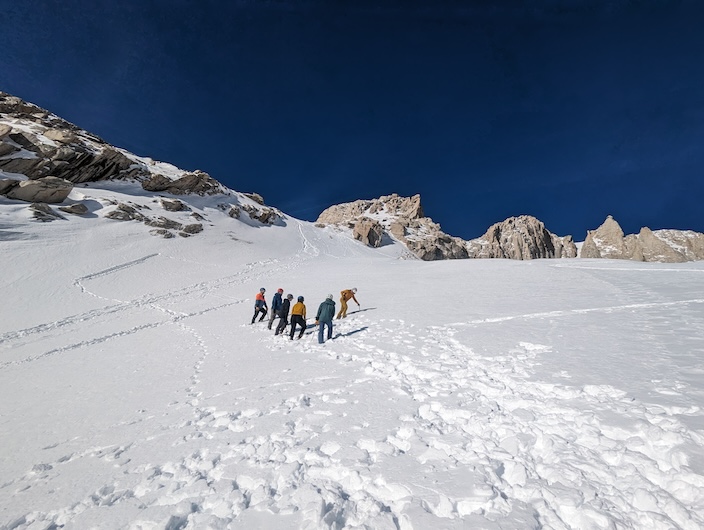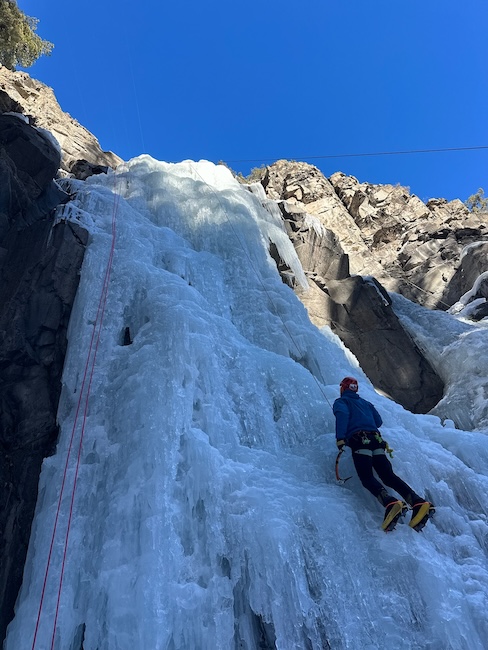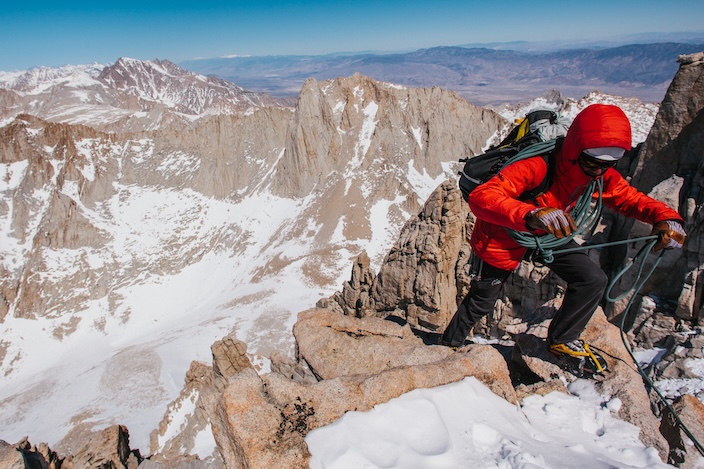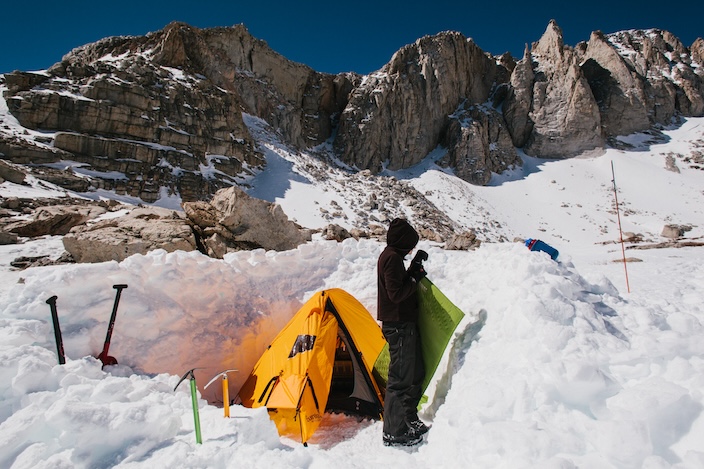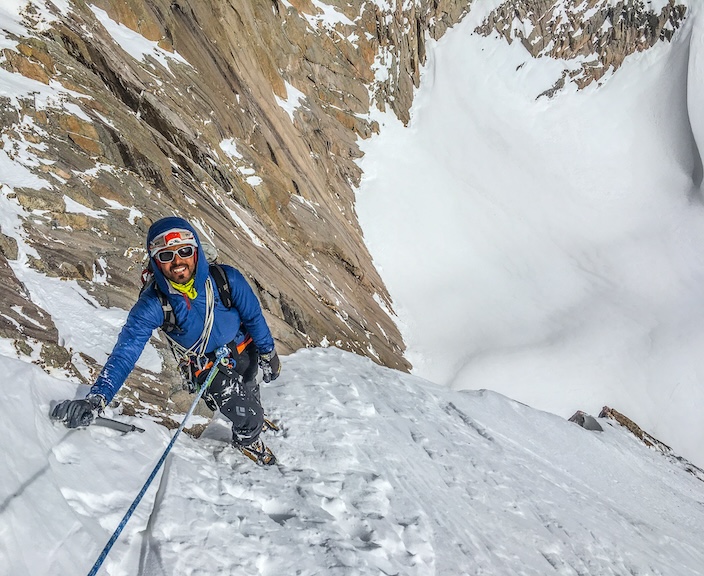Winter Mountaineering Course Overview Winter mountaineering encompasses one of the most aesthetic and rewarding facets of the sport of climbing. Like all forms of the sport, winter mountaineering has as much to do with mental challenge as it does with physical endurance and the successful application of technical skills. In addition to applying a wide range of climbing skills, as a winter climber you must:
understand and evaluate snowpack stability and assess avalanche hazards
have a thorough understanding of mountain weather
be capable of route finding under difficult conditions
readily maintain suitable shelters in cold and wind
attend precisely to the details of climbing technique and protective systems
The goal of the winter mountaineering course is to help intermediate to advanced level backpackers and mountaineers with minimal winter experience gain a complete repertoire of winter backcountry and climbing skills. We cover the challenges of cold weather camping at altitude; the complexity of backcountry travel (including both route finding and hazard evaluation); winter climbing, protective systems, and rope handling skills; and snowshoeing technique.
Locations
Mt Whitney Zone, California
The Mt Whitney Zone serves as a perfect training ground for winter camping and climbing. This course will take place around Upper Boy Scout Lake or Iceberg Lake at the base of Mt Whitney, which is the tallest peak in the Lower 48 states. Instead of gaining ice climbing experience like you do on the Ouray or RMNP winter mountaineering course, you will get a chance to ascend Mt Whitney! This winter ascent will be done via the Mountaineers Route and during the winter this route can range from a rock scramble lightly dusted in snow, to a full-on snow and ice climb with sections of up to 40 degrees in steepness.
VIDEO
Ouray, Colorado
The San Juan Mountains near Ouray see some of the finest snow conditions in North America. From stunning peaks, high mountain valleys, and an abundance of waterfall ice, the San Juans create one of the best winter sports areas in the United States. During the Ouray winter mountaineering course you will gain thorough waterfall ice climbing skills as you’ll spend your first 3 days at the famous Ouray Ice Park. On the last 2 days, you’ll head into the beautiful backcountry of the San Juan Mountains for an unforgettable winter backcountry camping experience.
VIDEO
Other Winter Courses
Winter climbers should also consider taking an avalanche safety course in Washington. While the winter mountaineering course covers some avalanche awareness skills, we can’t cover everything taught during an avalanche awareness course.
Winter Mountaineering Course Curriculum Winter mountaineering, like all mountaineering, is an activity that is extremely subject to route conditions, snowpack, and weather. All these conditions dictate, to some extent, which subjects will be covered in detail. Normal core topics of instruction include introductions to:
The Physics & Physiology of Cold Weather
An introduction to human physiology in cold weather
Equipment, clothing, and shelter for the winter and expedition climber
Internal maintenance - food and hydration in a cold environment
A short introduction to avalanche safety, including snowpack mechanics, avalanche release mechanisms, route selection, and hazard mitigation (for a complete introduction, take our Avalanche Level 1 course)
A brief introduction to avalanche rescue procedures (to become proficient, take the complete Avalanche Rescue course)
Winter and Expeditionary Climbing, and Protective Systems Skills
Selection and use of ropes, knots and harnesses
Design concept, selection and use of ice axe and secondary hand tools
Proper choice and application of the primary ice axe positions: piolet canne, panne, and manche
Use of crampons, including French technique (flat-foot), German technique (front-pointing), and American technique
Selection and placement of snow and/or ice anchors for protection and belays, including – as appropriate to the conditions – pickets, deadmen, and bollards
Winter rock climbing and mixed climbing skills
Establishment and maintenance of fixed lines and fixed protection
Skills for Winter Travel
Techniques for snowshoeing varied backcountry snow conditions
Techniques for snowshoeing with a pack in low and high angle terrain
Route finding and tour planning
White-out navigation using both map & compass and GPS-based techniques
Leave No Trace climbing, camping, and travel skills
Winter Mountaineering Course Dates Sierra Nevada, CA
February 16 - 20, 2026
March 9 - 13, 2026
March 23 - 27, 2026
April 6 - 10, 2026
Ouray, CO
Additional dates (including the option to do this course on skis or a splitboard) are available as a private course. Contact the AAI office for further details - [email protected] or 360-671-1505
Winter Mountaineering Course Details Prerequisites
Previous backpacking experience
Previous experience camping on snow
Excellent physical fitness
Program Details Max Ratio - 2:1 (Sierra Nevada, CA) and 3:1 (Ouray & RMNP, CO)
Capacity - 6 participants
Cost Inclusions and Exclusions
Inclusions : Included in the course cost is group technical climbing equipment, permits and access fees, and the guide fee.
On the Sierra Winter Mountaineering course, camping is also included since you will be backcountry camping for the duration of the course.
On the Ouray course, camping is only included on the fourth day of the course during the backcountry portion of the course. You will be responsible for your own lodging for all the other nights of the program.
Exclusions : Not included in the course cost is all personal clothing and climbing gear, transportation, gratuities to guide, meals while on the course, lodging before or after course dates, or travel insurance.
Again, lodging is not included in the Ouray Winter Mountaineering course except for the fourth day of the course.
Winter Mountaineering Course Related Courses
Program Finder
By Location
United States - Alaska
United States - Washington
United States - California
United States - Nevada
United States - Colorado
United States - Utah
Canada - British Columbia
South America - Argentina
South America - Bolivia
South America - Ecuador
South America - Patagonia
South America - Peru
Europe - Alps and Caucasus
Asia - Nepal and Tibet
Asia - Laos, Thailand, & Vietnam
Asia - China
Asia - Japan
Africa - Tanzania
Pacific and Antarctica
By Program Type
Instructional Courses
Group Summit Climbs
Expeditions
Skills Expeditions
Private Guided Programs
Treks, Tours, & Backpacking
Corporate Outings & Services
Government & Military
By Activity
Rock Climbing
Ice Climbing
Alpine Climbing
High-Altitude Climbing
Trekking and Backpacking
Skiing & Snowboarding
Guide Training & Rescue
Avalanche Training
Departure Month
July
August
September
October
November
December
Difficulty Level
Beginner
Moderate
Intermediate
Advanced
Very Advanced
x
